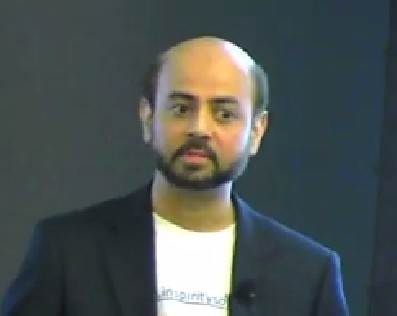Startup Founders Tell One Lesson Learned During 2014, Give Advice to Fellow Startups
It’s a real sign of the fast pace of the startup ecosystem in New Jersey that only a handful of the startups we approached to participate in our year-end story on startups actually did so. Many begged off, saying they were too busy. We hope that means big things for them in 2015.
We asked the participating founders and CEOs the following: “All of you have been entrepreneurs at startups for a while now, and you must have learned a good deal along the way. It’s now time to give advice to other startups, so I’d like you to describe one lesson that you’ve learned in the past year. Also, how could what you’ve learned help other entrepreneurs starting out?”
A big thank you to the five startups and their executives who took time from their busy lives and businesses to answer our questions.
Jason Webley, founder of LivinSport, and the team.
[LivinSport is a company that makes it really easy for athletic teams to send their player profiles to any college coach in the entire country.]

Jason Webley – “Your founding team is the most important factor in a startup. Having the right combination of founders and people willing to go the extra mile for the company beats having a great idea.”
Kyle Vaz – “There will be ups and downs. While being a successful entrepreneur is rewarding, the work involved is incredibly challenging. Entrepreneurs take huge risks, so it requires a resilient mindset.”
Di Tang – “People around you won’t fully understand until you’re successful. To succeed, you must be focused, patient, and never forget the goal of your startup. You can’t be scared of failure.”
Jay Gould, CEO and cofounder of Yashi
[Yashi is an award-winning privately held location-focused video advertising platform that analyzes tens of billions of video ads in real time on a monthly basis across thousands of websites.]

“The best advice I’ve ever received was to release control and frustration! Basically, the only thing that you can control in your life is your focus, actions, and responses to events and people. You can choose to be happy or upset, but remember that it’s a choice. So, worry less, trust more, and stress less, and smile more. Release the worrying and stressing about what could be, and focus on your actions and how you respond to the results. Enjoy the ride.”
Atiq Hashmi, founder of MobileXoom (formerly Inspiritysoft)
[MobileXoom offers an automated cloud-based solution to help small and medium-sized businesses create mobile versions of their websites within minutes, with just one click, saving time and money for them and enabling them to target the growing mobile consumer base.]

“Getting a technology startup to be successful involves a lot of moving parts, especially if you are looking for funding. For instance, one key area is to develop a business and sales model that can be executed well. It’s critical to understand the target market space and its dynamics, as more startups run into challenges in this area.
In addition, understanding all the moving parts and their interrelationships can be challenging, especially for startups at the beginning of their journey. Unless the founders have experienced a successful exit from a prior startup, an accelerator can be of great value in many ways. MobileXoom gained significant value from getting accepted into the high-tech accelerator program in New Jersey called ‘TechLaunch,’ and I would highly recommend applying to such a program.”
Patrick O’Neill, CEO, Amp Your Good
[ The Amp Your Good platform hosts online charity drives that raise the goods needed by nonprofit organizations. It’s similar to crowdfunding, but instead of donating money, people donate the most impactful food, building materials, pet food and life-saving supplies to the nonprofit organization they want to support.]

One startup lesson I’ve learned is how important it is to be trusted. Trust is a priceless currency, and the leverage it can provide is incredible. In a startup environment, you need all the help you can get. You may be constrained by financial resources in obtaining that help, and there’s always too much to do. Your ability to engage people and organizations to contribute — to work the extra hours, to work without direct compensation — rests heavily on whether or not people trust you. To create a culture of trust, you must be transparent, which is a challenge for many startups that don’t want to reveal too much of what they are doing. While there may be advantages to protecting some of your key information, it’s hard to engage people to get excited about what you are doing without knowing about what you are doing.
Entrepreneurial founders get to set the tone regarding transparency and trust. Set properly, it will help draw quality people and organizations to help fuel a startup’s path. ”
Vedar Brekke, cofounder and CEO of Meddle
[Meddle is a social content curation platform that makes it easy for anybody to showcase his or her expertise and passions.]

Empower your team members to do things that may not be 100% on target with your strategy or priorities. While this may seem counterintuitive, the fact is that everyone in a startup is overworked and underpaid, and needs to feel that the work is giving them personal rewards beyond the hope of future glory and riches. Allowing them to put their own signature on your product creates a greater sense of ownership than if they are just doing what “they are told.” Without some autonomy, a startup is nothing but a sweatshop!
Furthermore, allowing team members to make “calculated mistakes” (that you can quickly recover from) is also productive in the sense that there is just as much value in knowing what not to do as in what to do. Not to mention, when you’re innovating, the right answer is typically unknown, and the more diversity of perspectives, the greater the chance of getting it right. Any manager who thinks he or she knows what’s going to work or not is suffering from a Steve Jobs complex.

